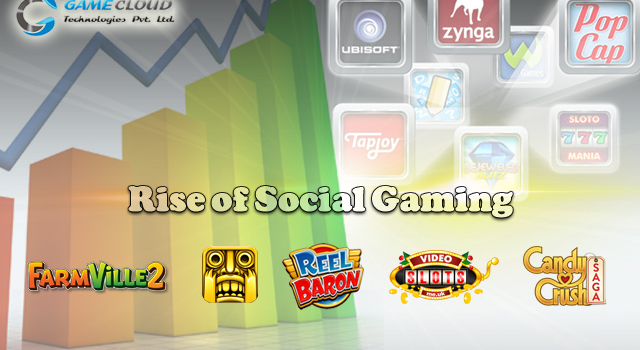
A recent conversation with a game testing expert has made me realise the paradigm shift that the gaming industry is undergoing. He was highlighting the recent surge in the count of social games that his India-based company has to attend yearly and how his busy schedule was largely getting occupied by the efforts rendered towards planning and execution of a successful testing/QA of a social-media-centric game. The expert’s viewpoint stands validated by the recent data shared by Statista (http://www.statista.com) – according to which, Candy Crush Saga the reigning most popular social game has about 11.29 million active users trying out the game on Facebook [Ref: http://www.statista.com/statistics/267003/most-popular-social-games-on-facebook-based-on-daily-active-users/]. That popularity was evident with the Mafia Wars and FarmVilla before culminating with Candy Crush Saga.
Those who still love their consoles can keep talking about the excitement and engaging experience they offer, but in the form of the ‘online gaming,’ a silent market has grown into a giant industry of its own. Thanks to social networking sites and dedicated game servers and of course the Games QA companies’ dedication in rising to the occasion – game publishers, of several sizes, are increasingly working on developing their own title to millions of fans worldwide. From simple bubble bursting games to the serious strategy-based ones, there is something for everyone, from a serious gamer to people who look for 5 minutes of relaxation.
Online gaming can perhaps be best defined by author Andrew Rollings who has termed it as a technology rather than a genre, connecting players rather than a particular pattern of gameplay.
A Vast Industry On The Rise
The success of the already massive (and still growing) gaming industry is represented by its flexibility of attending to the needs of its users – who tend to play in a lot of different ways. Cutting across age groups, ethnicity and interests, along with mobile device and console-based game titles, there are hundreds of online games for one to choose from today. You might be surprised to hear this, but online gambling has become one of the fastest growing and most profitable subsets of online gaming turning into one of the biggest industries in the world off late. In fact, online casinos, a much popular segment in the social game genre, are one of the fastest growing phenomena on the internet and are estimated to be of worth around the $40 billion mark by 2015.
The success has been so much that brick and mortar casinos have lost considerable revenue and footfall to their online counterparts.
Social Gaming – The New Phenomenon
Social gaming is the perfect merger between the online games and the consoles. Take the case of those online casinos that don’t involve any cash transaction. Here, you can try playing poker, slots, bingo or blackjack for the pure fun’s sake. While the normal console games rely on strategy, manoeuvring, alacrity towards point-and-shoot – in addition to a lot of dramatic sights and sound – the social games offer you more ‘one-the-go’ fun and entertainment. Since no money changes hands, there are no legal restrictions and regulations that apply to these online casinos compared to ones where people engage in full-fledged gambling.
Is It A Soft Sell Strategy?
Some people have termed these no-cash casinos as soft sell marketing tricks of the real-world casinos that are trying to lure more and more users into their ecosystem. This remains an unresolved argument as others see this as a stand-alone industry which exists on its own merits and rather borrows the fun and entertainment side of gambling, leaving the money aside. But you have Bitcoin (and alike) to make the matter more complicated – across a wider variety of games involving in-game purchase/upgrades.
Still, soft sell argument may not be worth the discussion because the average revenue from the non-cash gamers is reported to be 30 to 40 times lesser compared to the counterparts involving cash transactions (considering casino games here). But if this target group could be lured into the cash-based online casinos or other games that require monetary investment (virtual or real-type) their revenues would multiply manifold, immediately, without any doubt.
It is also interesting to note that the social gamers come from the same demography as people in the monetized games – the young, affluent males with time on their hands. Thus it may not be too difficult for these casinos or a role play game (RPG) running on a social platform to lure the non-monetized players into their fold.
Even if we ignore monetary gains, what we can’t discount is the humongous popularity that these social games enjoy. And with popularity, there will be sponsors thronging for consideration.
Undoubtedly, there are good times ahead for Social game testers and QA experts.
Article by,
Laxmikant B. Thipse
Founder & CEO
GameCloud Technologies Pvt Ltd
Writer’s LinkedIn posting / Source: https://www.linkedin.com/today/post/article/20141121131628-52500864-social-gaming-the-lynchpin-of-an-industry-wide-paradigm-shift
